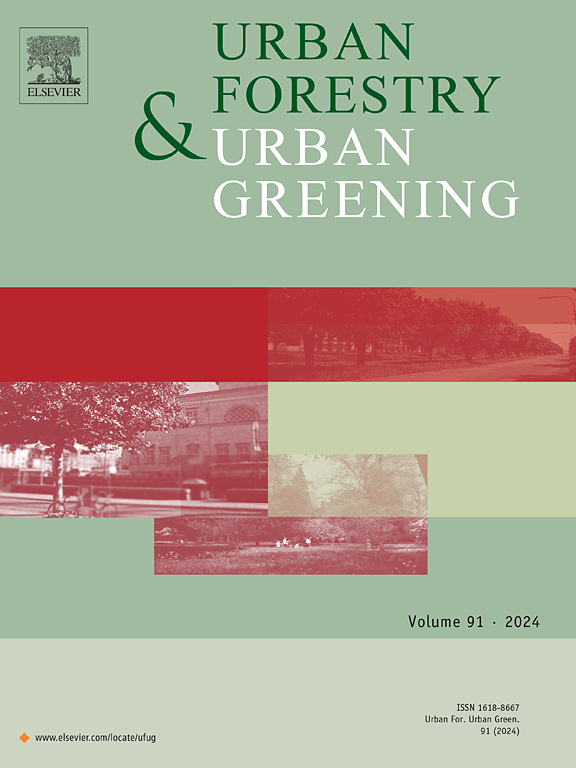Regreen your private space: Understanding homeowners’ soil de-sealing intention through structural equation modelling, using theory of planned behaviour
IF 6.7
2区 环境科学与生态学
Q1 ENVIRONMENTAL STUDIES
引用次数: 0
Abstract
Soil de-sealing and regreening are key actions for climate change adaptation/mitigation in an urban context, leading to reduced flood risks and heat island effects, as well as positively impacting biodiversity , life quality and wellbeing. While prior research identified drivers and barriers of traditional and sustainable gardening practices, there is no research on soil de-sealing in a private context using a behaviour framework. Therefore, this study aims to better understand the factors influencing homeowners’ intention to soil de-seal their private outdoor space, using an extended theory of planned behaviour. We conducted a quantitative survey with Flemish homeowners (重新绿化您的私人空间:利用计划行为理论,通过结构方程建模了解房主的土壤去密封意图
土壤去密封和绿化是城市环境中适应/减缓气候变化的关键行动,可减少洪水风险和热岛效应,并对生物多样性、生活质量和福祉产生积极影响。虽然先前的研究确定了传统和可持续园艺实践的驱动因素和障碍,但没有使用行为框架在私人背景下研究土壤去密封。因此,本研究旨在利用扩展的计划行为理论,更好地了解影响房主对其私人户外空间进行土壤封闭意图的因素。我们对佛兰德房主进行了定量调查(n = 420,Mage = 50.55, SDage = 14.46,男性/女性= 191/229),并应用结构方程模型进行分析。结果表明,态度、主观规范、感知行为控制和促进条件与土壤封闭意愿呈正相关。此外,道德义务与态度正相关,主观知识与感知行为控制负相关。我们的研究结果表明,政策制定者应该注重培养主观规范,让人们体验土壤的“去封闭”,并鼓励可持续的行为模仿。此外,他们应该通过资金和实际支持以及逐步指导来说服人们土壤去封的可行性。最后,通过强调小动作对更大生态系统的影响来激活人们的个人道德规范,可能会进一步鼓励公民采取行动。
本文章由计算机程序翻译,如有差异,请以英文原文为准。
求助全文
约1分钟内获得全文
求助全文
来源期刊

Urban Forestry & Urban Greening
FORESTRY-
CiteScore
11.70
自引率
12.50%
发文量
289
审稿时长
70 days
期刊介绍:
Urban Forestry and Urban Greening is a refereed, international journal aimed at presenting high-quality research with urban and peri-urban woody and non-woody vegetation and its use, planning, design, establishment and management as its main topics. Urban Forestry and Urban Greening concentrates on all tree-dominated (as joint together in the urban forest) as well as other green resources in and around urban areas, such as woodlands, public and private urban parks and gardens, urban nature areas, street tree and square plantations, botanical gardens and cemeteries.
The journal welcomes basic and applied research papers, as well as review papers and short communications. Contributions should focus on one or more of the following aspects:
-Form and functions of urban forests and other vegetation, including aspects of urban ecology.
-Policy-making, planning and design related to urban forests and other vegetation.
-Selection and establishment of tree resources and other vegetation for urban environments.
-Management of urban forests and other vegetation.
Original contributions of a high academic standard are invited from a wide range of disciplines and fields, including forestry, biology, horticulture, arboriculture, landscape ecology, pathology, soil science, hydrology, landscape architecture, landscape planning, urban planning and design, economics, sociology, environmental psychology, public health, and education.
 求助内容:
求助内容: 应助结果提醒方式:
应助结果提醒方式:


